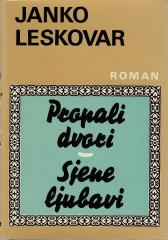
Hiljadu ždralova
The tea ceremony, arranging flowers, arranging gardens and the art of creating beautiful porcelain stand in the background of this novel as symbols of the eternal and timeless in human creativity.
Human feelings, in contrast to artistic creativity, are shown as momentary, fragile, changeable and transitory. In this contrast between man and art, Kawabata wove the subtle and delicate plot of the novel. The main character, Kikudi, is a victim of his childhood memories and fails to occupy a certain position in reality. After the death of his father and mother, he is looking for fresh and pure love, but he cannot get rid of the dark memories from his childhood. Then he falls fatally in love with his father's former lover, Mrs. Ota, who represents a bridge between the past and the present. Overwhelmed by remorse and guilt, Mrs. Ota commits suicide. After her death, Kikudi cannot get rid of his longing for the deceased, but gradually his love for his mother is transferred to her daughter Fumiko. The end of the novel is uncertain because Fumiko is also overcome with guilt and cannot openly accept Kikudi's love.
One copy is available
- Slight damage to the cover





